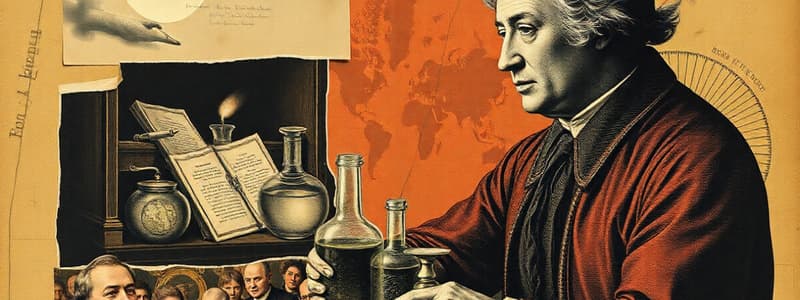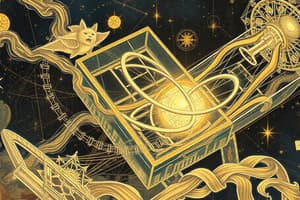Podcast
Questions and Answers
How did Bill Newman’s experiment with Newton's alchemical recipe contribute to our understanding of modern science?
How did Bill Newman’s experiment with Newton's alchemical recipe contribute to our understanding of modern science?
His recreation demonstrated that Newton's alchemy was systematic and produced reproducible results, akin to modern scientific methods.
What fundamental questions did alchemy seek to answer according to Pamela Smith?
What fundamental questions did alchemy seek to answer according to Pamela Smith?
Alchemy pursued questions about the nature of the Earth and the universe, including the components of matter.
What revelation about Isaac Newton's beliefs surprised historians regarding his role within the Church of England?
What revelation about Isaac Newton's beliefs surprised historians regarding his role within the Church of England?
Historians were surprised to learn that Newton opposed the doctrine of the Trinity and believed Christ was not equal to God.
In what way did Jed Buchwald characterize Newton's approach to alchemy?
In what way did Jed Buchwald characterize Newton's approach to alchemy?
What was Newton's stance on the Trinity and how did it affect his career?
What was Newton's stance on the Trinity and how did it affect his career?
How did Newton integrate his study of the Bible with his scientific pursuits?
How did Newton integrate his study of the Bible with his scientific pursuits?
What was Edmond Halley's question to Newton, and what was Newton's response?
What was Edmond Halley's question to Newton, and what was Newton's response?
What is the inverse square law, and how did it relate to Newton's work on planetary orbits?
What is the inverse square law, and how did it relate to Newton's work on planetary orbits?
Describe how Newton's view of religion and science differed from contemporary perspectives.
Describe how Newton's view of religion and science differed from contemporary perspectives.
What were Newton's three laws of motion?
What were Newton's three laws of motion?
How did Newton demonstrate that gravity affects both terrestrial and celestial motion?
How did Newton demonstrate that gravity affects both terrestrial and celestial motion?
What is the universal law of gravitation according to Newton?
What is the universal law of gravitation according to Newton?
What was the key criticism of Newton's theory of gravity after the publication of Principia Mathematica?
What was the key criticism of Newton's theory of gravity after the publication of Principia Mathematica?
Describe the significance of Newton's work in the context of scientific history.
Describe the significance of Newton's work in the context of scientific history.
Flashcards are hidden until you start studying
Study Notes
Newton's Alchemy
- Newton's alchemical recipe, "the net," was inspired by the Roman poet Ovid's "The Metamorphosis," which tells the story of Vulcan catching Venus and Mars in bed.
- In alchemy, Venus, Mars, and Vulcan represent copper, iron, and fire, respectively.
- Newton's alchemical recipes were systematic, reproducible, and verifiable, containing elements of modern science.
- Other scientists, including members of the Royal Society, practiced alchemy during Newton's time.
Newton's Theology
- Newton held a secret belief that the Christian Trinity was false, believing Jesus was the son of God but not his equal.
- Newton's theological beliefs were considered heretical during his time.
- Newton risked his career and even faced imprisonment for denying the Trinity.
The Principia
- Edmond Halley asked Newton about the curve described by planets, suggesting a force of attraction towards the sun.
- Newton's calculation proved that a planet obeying the inverse square law of gravity would travel in an elliptical orbit.
- Newton's masterpiece, the Principia Mathematica, established a new framework for understanding the universe, building on Galileo's work.
- Newton proposed the three laws of motion: inertia, F=ma, and action-reaction.
- Newton's thought experiment with a cannonball and gravity illustrated how the same laws govern motion on Earth and in space.
- The concept of universal gravitation, formulated by Newton, suggests the same force of gravity operates across the universe.
Newton's Legacy
- Newton's rivals, Robert Hooke and others, disputed his work, questioning how gravity works.
- Newton's alchemical studies may have influenced his idea of gravity, as he was fascinated by the "vegetation of metals" and the concept of "active principles."
- Newton's alchemical experiments yielded no significant scientific breakthroughs, possibly leading to a nervous breakdown.
- Newton's later life was marked by a shift towards public recognition and social status, including becoming Master of the Mint and a Member of Parliament.
- Newton published his second major work, Opticks, which explored light and included his ideas on calculus.
- Newton maintained his theological beliefs, keeping his heresy a secret, and continued to explore biblical passages for divine knowledge.
- Newton was buried in Westminster Abbey, where his scientific achievements are celebrated, while his alchemical and theological beliefs remained largely unknown.
Newton's Alchemy
- Newton's alchemical work involved recreating recipes from ancient texts.
- "The net" is a purple alloy described in the poem Metamorphosis by Ovid.
- Newton's alchemy was perceived as a systematic process with reproducible results.
- Other leading scientists shared Newton's interest in alchemy, including members of the Royal Society.
- Newton's alchemical pursuits aimed to understand the fundamental components of matter.
Newton's Religious Beliefs
- Newton concealed his heretical religious beliefs, particularly concerning the Trinity doctrine.
- He believed Christ was the son of God but not God's equal, a view considered heresy by the Church of England.
- Newton was required to become a minister at Trinity College, but this was a position he strongly opposed.
- He risked imprisonment for his beliefs.
- Newton wrote extensively on theology, often correlating Biblical passages with astronomical observations.
- He sought to determine the timing of the end times and Christ's return based on his analysis of the Bible.
Newton's Contributions to Physics
- Halley's question about planetary orbits triggered a pivotal moment in Newton's scientific career.
- Newton's mathematical proof demonstrated that planets following an inverse square law of gravity would orbit in ellipses.
- He spent 18 months working on his masterpiece, the Principia Mathematica, which laid out his theory of gravity.
- The Principia is considered the greatest scientific book ever written.
- Newton redefined understanding of motion, arguing that the same laws govern motion on Earth and in the heavens.
- He proposed three laws of motion: inertia, acceleration, and action-reaction.
- Newton formulated the universal law of gravitation, showing the same force governs motion on Earth, the moon, and celestial bodies.
- His revolutionary work built upon the observations of his predecessors like Galileo.
- Newton's contributions to astronomy were central to understanding the solar system and its motions.
### Newton's Personal Struggles
- Newton was plagued with a period of intense mental distress, likely due to exhaustion and mental strain.
- He accused John Locke of attempted harm, but ultimately accepted that his behavior stemmed from his illness.
Newton's Later Life
- Newton received a prestigious position as Master of the Mint, responsible for currency.
- He became a member of Parliament and president of the Royal Society.
- He published his second major scientific work, Opticks, which expanded on his studies of light and included his work on calculus.
- He continued to remain deeply involved in theology until his death, although he kept his beliefs largely private.
### Newton's Legacy
- Newton is celebrated as a pivotal figure in the history of science, whose work revolutionized understanding of the universe.
- Newton's extensive work in science, religion, and alchemy reveals a complex and multifaceted individual.
Studying That Suits You
Use AI to generate personalized quizzes and flashcards to suit your learning preferences.



